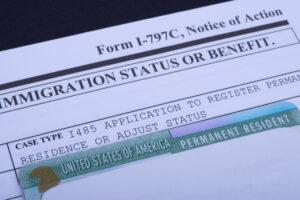Immigration Status – What Are the Different Types of Immigration Statuses?
 Immigrating to the United States is typically a lengthy, complicated process. As an immigration attorney in Massachusetts, Gregory P. Turner helps people regardless of their immigrant status types.
Immigrating to the United States is typically a lengthy, complicated process. As an immigration attorney in Massachusetts, Gregory P. Turner helps people regardless of their immigrant status types.
Types of Immigration Status
The four types of immigration status are as follows:
United States Citizen
Someone born in the U.S. or naturalized (became a citizen after immigration). All citizens, whether born here or naturalized, enjoy the same rights and privileges.
A lawful permanent resident can usually apply for citizenship after 3-5 years.
Once you become a US citizen you can help certain family members obtain lawful permanent resident status.
Permanent and Conditional Residents
Green card holders are Lawful Permanent Residents or “LPRs”.
LPRs can legally live and work in the U.S.. Many people obtain LPR status through certain family members who have either LPR status or are US citizens. Depending on your circumstances, you can may also be able to obtain LPR status and eventually citizens through several other paths. These include, but are not limited to employment, asylum, refugee status, parole, the Violence against Women (and men) Act and Temporary Protected Status.
LPR status and citizenship are not the same as visas. Students and other visitors outside the country are granted non-immigrant visas. That means you have temporary permission or status to stay in the US to visit, study, or do business. Overstaying a visa can sometimes result in removal proceedings against you (deportation) In some cases, a visa overstay can be “cured” by certain family members who are US citizens. If you wish to stay in the US longer than your visa permits, you should consult with an attorney to discuss your options.
Out of Status and Undocumented Persons
If you have entered the United States lawfully but you have overstayed your visa or other permission, you are said to be “Out of Status”
If you entered the United States without a visa or parole or other unlawful entry, you are said to be “Undocumented.” If your entry into the US was unlawful, you may be subject to removal proceedings. However, there are several exceptions which may qualify you for relief from those proceedings. Most commonly, people who enter the US without prior permission may claim asylum within certain time limits which vary from case to case. Depending on your circumstances, you may qualify for asylum or other relief from removal proceedings.
Regardless of your status, you should seek legal help from the Law Offices of Gregory P. Turner to determine and exercise your options. Correctly following all processes and procedures can be tricky. There are many traps for the unwary.

